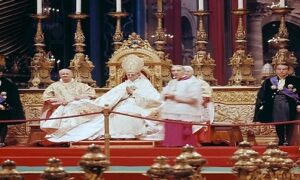This is Faith in Play #62: Theocracy, for January 2023.
Whether our imagined worlds are vast universes or small villages, there is always someone, person, people, or other, who is in charge. We call that government. In most of our medieval-themed worlds, and many of our futuristic ones, we envision a monarchial feudalism. In the modern world, we tend to believe in democracy, and some see it as the form of the future. Yet that doesn’t make it the best form for our games.

Winston Churchill once said that democracy was “the worst form of government, except for all the other forms.” Plato placed it third from the bottom, above rulership by those most honored and rulership by the wealthy. Yet the best form is elusive.
Unless it is theocracy, the direct leadership of the people by God.
That has been the government of choice in more times and places than perhaps you might have realized. The question is, how is it implemented? That is, how do we, the people, know what God, our leader, is telling us to do? And in most instances, it requires the mediation of a person or people, some human who can tell the people what God wants. Therein lies the rub, the problem.
One solution is that the priests serve as intermediaries, that they are in contact with God and so convey His will to the people. Such priesthoods are generally organized and frequently hierarchical, such that there is one head priest who is the ultimate authority. This creates what is effectively a monarchy run through the religious systems. This is the system in Iran today. Of course, dissension among the religious leaders themselves can lead to a change in government, as disagreement over what God is directing might cause the overthrow of whoever has the final word.
A simpler solution decides that some individual is actually the personification of God. Most of us will think of Pharaoh, who was said to be the descendant of Ra, and of the Caesars, who claimed to be gods; but in relatively modern times the Emperor of Japan was still called Son of the Goddess by that country’s citizenry. This locks our leadership into relatively more stabilty, because the leader can only really be replaced by a member of his family, unless the religion itself is overthrown.
An effort can be made to remove the human element by relying on oracles to speak for God. However, there is still the question of who is permitted to speak to the oracle and who can hear what it answers. If a human has to deliver what the oracle says, the human element remains.
Ancient Israel was a theocracy, a fact recognized by Josephus: God Himself ruled the nation, and otherwise people were expected to follow the law as delivered by Moses. Still, God relied on prophets, people who spoke on His behalf, originally Moses and Joshua followed by those called judges, who settled disputes and led the people in times of crisis. The answer to how you identified these leaders was that if they predicted anything it was always right. Not all of them ever predicted anything, though, so sometimes it was a matter of following the guy who said God had spoken to him, and hope he was telling the truth. Sometimes they weren’t. After all, claiming that you heard from God was an easy way to make yourself seem important, and it wasn’t always easy to disprove.
Within Christian churches we probably have most of these forms represented–groups that elevate one individual as God’s ultimate spokesperson, groups that think their clergy or elders or some other group has the best divine connection, groups that believe the local pastor speaks for God–but we have one more. We say that individual believers are individually connected to God, and can receive His guidance directly from Him. That makes us the ultimate theocracy, God ruling all of us by directing each of us. The difficulty again, though, is that not one of us can know what God is telling someone else. As with the prophets, you cannot know whether God has actually spoken to me or not; all you can know is whether what He has told me seems consistent with what He has told you–and then, how can anyone else know which one of us has actually heard from God? Sometimes it is difficult enough for us to know this about ourselves.
In our fantasy worlds this becomes the more complicated, because there actually might be several different gods, spirit beings of immense power who seek the worship and service of mortals, and they might have competing agendas and be directing their subjects in conflicting directions. Even if they all belong to the same pantheon, that’s no proof that they will be working in harmony toward the same objectives. Theocracy does not eliminate conflict. As Christian Gamers Guild writer Michael Garcia noted in an article a couple years ago, not even a monotheistic theocracy necessarily eliminates conflict.
So theocracy is a viable form of government in your fictional worlds, and there are several ways to implement it. Both the concept itself and the ways in which you apply it can be fodder for considering the reality behind it.
Previous article: Christian D&D.
Next article: Inadequacy.

Iconoclasm was one of the greatest disasters in the old Civilization board game.